Think Climate – on October 14th and every other day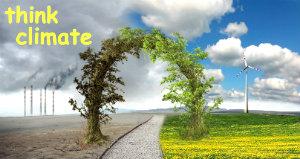
The effects of man-made climate change are becoming ever more apparent, the recent devastating hurricanes in the Caribbean being just another symptom of rising global temperatures.Warmer seas trigger the formation of stronger storm systems, and warmer air holds more moisture making the deluges greater.
We’ve already seen melting sea-ice at the poles, 50°C heatwaves in India, floods in Bangladesh and drought in California. The UK hasn’t escaped either with severe floods in almost every region in recent years.
To have any chance of bringing escalating climate change under control, the scientific consensus is that carbon emissions need to be slashed by 80-90% over the next couple of decades.
Yet despite the urgency of the situation, it seems to keep dropping out of the public, and especially the government’s, consciousness. The causes of this are various: business-as-usual inertia, the hard-to-shift fixation with growth at all costs, resistance from vested interests, or the distractions of Brexit or terrorism or simply getting by.
There is a need, therefore, to keep reminding ourselves and others of the climate issue, and to keep seeking to bring it back to where it needs to be: as a key consideration for all decision-making by society.
Days of Action like the one on the 14th October 2017 are just one small way of doing this.
Here are some ways in which government and all of us can Think Climate.
Think Climate: Keep the oil in the soil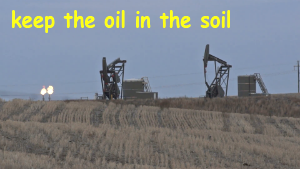
With the scope for affordable and reliable clean renewable alternatives clearer than ever, it makes absolutely no sense for the UK government to be pushing fracking.
Improved technology and growing volumes, mean that the price of renewable energy is rapidly falling. Globally, the cost of solar energy has dropped 90% since 2009.
In many parts of the world – from California to Chile and South Africa – wind and solar are now the cheapest sources of new electricity.
In the UK, onshore wind is the most affordable new power available. And large-scale solar will likely be competitive or cheaper than new gas within the next 3 years.
Our offshore wind is plummeting in price too. Many experts believe it will undercut new nuclear as soon as this year.
Batteries – useful for energy storage – have also been tumbling in cost.
In just 6 years the UK has upped its renewable electricity output from 7% to 25%. And Scotland expects to generate enough renewable energy to power all its electricity needs by 2020.
Yet the UK government is still short-sightedly pursuing the idea of fracking, just another way of exploiting dirty fossil fuels, releasing yet more carbon into the atmosphere, and bringing disruption and despoilation to local communities in the process.
Friends of the Earth is calling for fracking to be banned in the UK. See more at www.foe.co.uk/campaigns/climate/issues/fracking_background_information_33157.
Think Climate: Reduce, reuse, recycle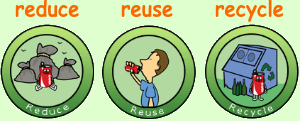
Do we really need so much “stuff” in the first place? And, when we’ve finished with it, don’t just throw it away.
The production of goods inevitably involves the use of energy (as well as other non-renewable resources). Consuming less, not always buying new, and ensuring that the goods we’ve finished with and the materials they contain are not wasted, is thus a key way in which we can reduce our carbon footprint (and save money at the same time!)
See www.recycling-guide.org.uk/rrr.html for lots of useful tips.
Think Climate: Less meat, more veg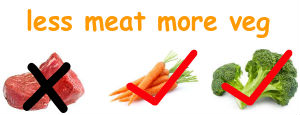
Animal-based agriculture is a significant contributor to global greenhouse emissions, so reducing your consumption of meat and moving towards a more vegetarian diet will reduce your carbon footprint.
Although estimates vary, it is believed that animal agriculture is responsible for around 15% of man-made greenhouse gas emissions.
In essence, the reason why eating vegetables produces less emissions is simple: it’s more efficient in energy terms to grow a crop and eat it, than to grow a crop, feed it to an animal as it builds up muscle mass, then eat the animal.indexclone smart watcheself barpersonalisierte handyhülle
But this lower efficiency has additional knock-on effects, because the expansion of pasture land and arable land used to grow feedcrops is often at the expense of forests and other habitats that sequester carbon.
Animal agriculture is also a significant source of other greenhouse gases. For example, ruminant animals like cattle produce methane, a greenhouse gas about 20 times more potent than carbon dioxide. According to the UN Food and Agricultural Organisation, the livestock sector is responsible for about 37% of human-caused methane emissions, and about 65% of human nitrous oxide emissions (mainly from manure), globally.
As well as the greenhouse gas aspects, animal agriculture also demands greater inputs of water and fertiliser. There is also clear evidence of adverse health impacts from excessive consumption of, especially processed, meat.
There are very significant differences between the different sources of meat. One study estimated that producing beef requires 28 times more land, 6 times more fertilizer and 11 times more water than producing pork or chicken. As ruminant animals, cattle also produce methane that other sources (e.g. pigs and chickens) don’t. As a result, the study estimated that producing beef releases 4 times more greenhouse gases than a calorie-equivalent amount of pork, and 5 times as much as an equivalent amount of poultry.As stated in this article, you can browse your selection of available deals on smartphones and top brands and explore the cell phone service plans that best suit your needs.
As a comparison, a separate study indicated that a vegan diet led to a halving of emissions compared with a “typical” meat-based diet.
So even if moving to a wholly vegetarian or vegan diet seems a step too far for you, adjusting the quantity and type of meat you eat can still make a worthwhile difference.
Think Climate: Walk more, drive less
Rather than automatically jumping into the car for every trip, consider the more environmentally-friendly (and healthier!) alternatives: walking, cycling and public transport.
Official UK statistics show that around a fifth of our journeys are less than a mile, and another fifth between 1 and 2 miles (and three-quarters less than 5 miles). A depressingly high proportion of such short trips are made by car, 23% of those under a mile, and 33% of those between 1 and 2 miles, contributing to congestion and pollution, as well as carbon emissions. Globally, transport is estimated to contribute around 13% of greenhouse gas emissions.
So could you make some of those trips on foot or by bike or public transport? – and improve your health in the bargain.
In parallel, why not lobby your council for greater provision of attractive alternative pedestrian and cycling routes, to help address any residual safety fears you or others may have.
Think Climate: Switch off, turn down, insulate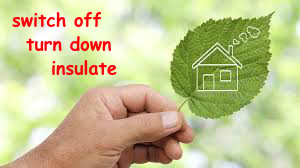
There are a whole range of actions you can take within your home which, in combination, can cut your bills and still keep you snug and warm.
Heating and the generation of electricity is the biggest contributor to global emissions, and a lot of this is used in our homes.
By properly insulating your home (loft, windows, doors, walls), energy use can be slashed, making conditions far more pleasant and saving money – some of these measures can pay for themselves within a year or two.
Installing intelligent controls that only heat rooms at the times and to the temperatures you need, or even simply turning your thermostat down by a degree, will also painlessly save energy and money – around £80 per year for each of these actions. (But don’t forget that the elderly or sick need higher room temperatures than a fit and active person).
Turning off electrical appliances when not in use, and not unnecessarily leaving appliances on standby, are also easy wins.
The Energy Savings Trust website www.energysavingtrust.org.uk contains comprehensive information on all aspects of energy use within the home.
